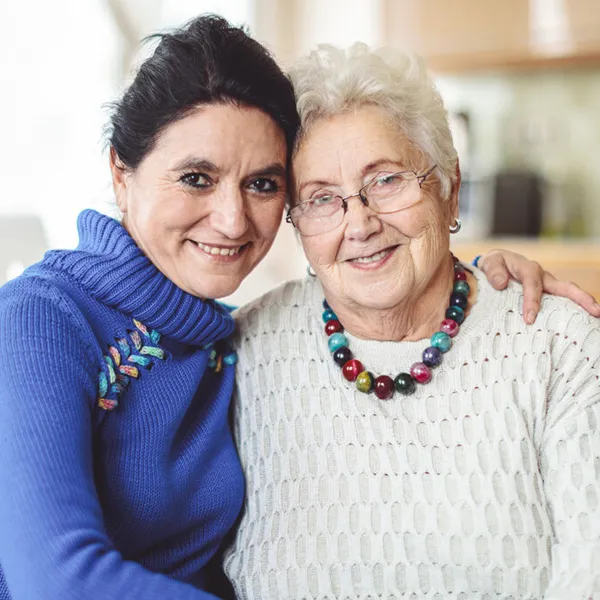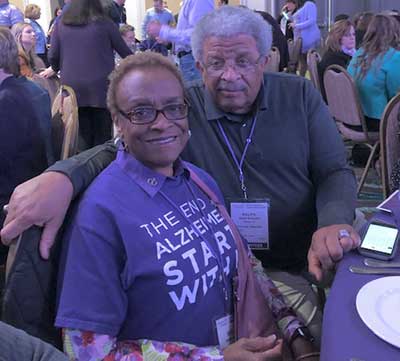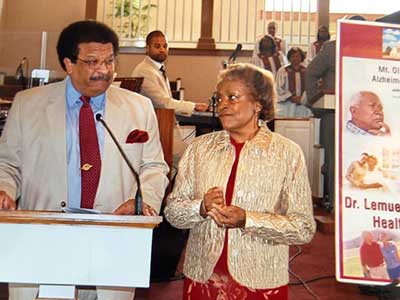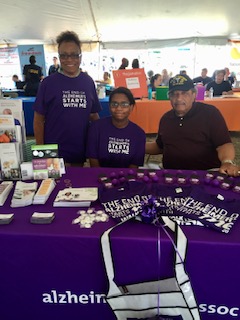
Your Gift Can Make 2x the Impact
Your Gift Can Make 2x the Impact
A gift can go twice as far during our February $100,000 2x Match. Your contribution by Feb. 27 will fuel Alzheimer’s research and help provide essential care and support.
Donate NowHusband and Wife Team Up as Volunteer Community Educators in the Fight to End Alzheimer’s
Ralph
My mother passed when I was young, and my dad’s second wife had Alzheimer’s. In their small Kentucky community, there weren’t a lot of resources available, and my family encouraged him to get support from outside help. Dad did everything for her: he wouldn’t let anyone else bathe her, cook for her, provide care for her. He truly thought that no one could take better care of her than he could.
One day, my stepmother was wandering the house looking for my dad and fell down the basement steps, injuring herself. He was outside in the yard, picking her flowers. I know that day haunted him for years to come.
Mollie
 My father was diagnosed with vascular dementia when I was 17 years old and about to head off to college. I have a younger brother, eight years younger than me, and my mom had to work to support us. Long-term care is a sensitive issue, and I am very open about when my family decided to admit my father into a nursing home. Between dad’s seizures and habits such as leaving the stove on, it was too dangerous and became too much for my mom to handle. It was the right decision for both my mother and my father.
My father was diagnosed with vascular dementia when I was 17 years old and about to head off to college. I have a younger brother, eight years younger than me, and my mom had to work to support us. Long-term care is a sensitive issue, and I am very open about when my family decided to admit my father into a nursing home. Between dad’s seizures and habits such as leaving the stove on, it was too dangerous and became too much for my mom to handle. It was the right decision for both my mother and my father.I tell my personal story because it’s a way to connect with people on a different level. Communication is about relationships and testimonies: sharing your story.
Ralph
Much of the work we do is face-to-face and faith-based. A congregation builds trust in their church, with their pastor and with each other. We empathize with each other, asking questions that help build trust, and we don’t treat our interactions as a one-time educational session. We follow up: “Did the resources we provided prove useful? What else do you need? What have you learned now that you’ve researched Alzheimer’s disease a bit more?”
In our presentations, we open up by sharing our backgrounds and the knowledge we have gained over the decades. Then we ask the group what they want to get out of our presentation, trying to address their needs during our time together. We listen, we share, we inform and if we don’t have an answer, we find it.
 We have worked with caregivers one-on-one over the phone, and we have spoken to crowds of hundreds of people. With groups less than 20 people, there are more opportunities to touch people and work closely to help them navigate Alzheimer’s disease and their unique situations. When working with a large church community, we may spend time with men’s or women's fellowships, or we may meet with a Sunday school group of children. We go where we are most needed.
We have worked with caregivers one-on-one over the phone, and we have spoken to crowds of hundreds of people. With groups less than 20 people, there are more opportunities to touch people and work closely to help them navigate Alzheimer’s disease and their unique situations. When working with a large church community, we may spend time with men’s or women's fellowships, or we may meet with a Sunday school group of children. We go where we are most needed.Mollie
We acknowledge the barriers that have prevented people in the black/African American community from getting involved with clinical studies research and we address the past. But that was then. This is now.
I’m personally involved in a clinical study through Indiana University that came to be through collaboration of the community advisory board Ralph helped found at the Indiana Alzheimer Disease Center (IADC) and the Greater Indiana Chapter of the Alzheimer’s Association. Over the course of the study, community-based outreach resulted in 185 African American referrals to the IADC. Prior to this research, the minority percentage at the IADC was 8.8%; today it is 19%. In addition, 300 African American volunteers were added to the TrialMatch database.
 The numbers show that we can make a difference. In order for us to find a solution for a health issue plaguing the African American community more than other groups, we need to step up this type of research. This can only be done when African Americans are educated about the process and encouraged to participate to change their own futures and the futures of their children and grandchildren.
The numbers show that we can make a difference. In order for us to find a solution for a health issue plaguing the African American community more than other groups, we need to step up this type of research. This can only be done when African Americans are educated about the process and encouraged to participate to change their own futures and the futures of their children and grandchildren.Ralph
It takes longer to build trust in the black/African American community, especially when relating to health issues, and we seek to bond with the community as individuals and a safe space to share thoughts and emotions. We believe that stigma is declining because of the hard work the Association is doing; we see that in our community. We are helping create a sense of awareness, establishing relationships we hope will last for a long time.
Volunteering is a way of life for us. As long as pastors and community leaders continue to ask us to speak — whether that is to one person on their porch or a congregation of thousands at a symposium — we are here, and we are ready.
Mollie
Most of all, we share our passion, the why: I fight for my father and I am involved in a research study for him. Every year I go for cognitive testing and share that with a group makes them understand my sincerity, that I care about them and their futures.
She was connected to resources from the Alzheimer’s Association and felt liberated, armed with all these ways to understand the disease better and find respite care to keep herself healthy. That moment meant a lot to me and solidified what Ralph and I do every day: giving people HOPE. We may not have a cure yet, but the research is being done and we are so proud to be a part of it.
About: Ralph was vice president and director of strategic sales for Eastman Kodak, U.S. and Canada. Ralph earned an advanced science degree in professional studies in Medical Magnetic Resonance Imaging (MRI) from Upstate Medical University, School of Health Professionals, Syracuse, New York and a B.S. in Radiology Business Management from The George Washington University School of Medicine and Health Sciences in Washington, D.C.
Mollie is a retired director of rehabilitation programs at Jewish Senior Life and a memory care service line manager. She holds a B.S. in Occupational Therapy and an M.A. in adult education. She also taught Occupational Therapy at the Community College of Baltimore and at Indiana University School of Medicine.
Ralph and Mollie co-founded the Alzheimer’s/Mt. Olivet Baptist Church Health and Support Ministry in Rochester before moving to Indiana to be closer to family. Both retired, the Richards now serve as volunteer community educators for the Greater Indiana Chapter of the Alzheimer’s Association and are members of the community advisory council of the Indiana University Alzheimer’s Disease Center.
Related articles:
Volunteer
Alzheimer's Resources
